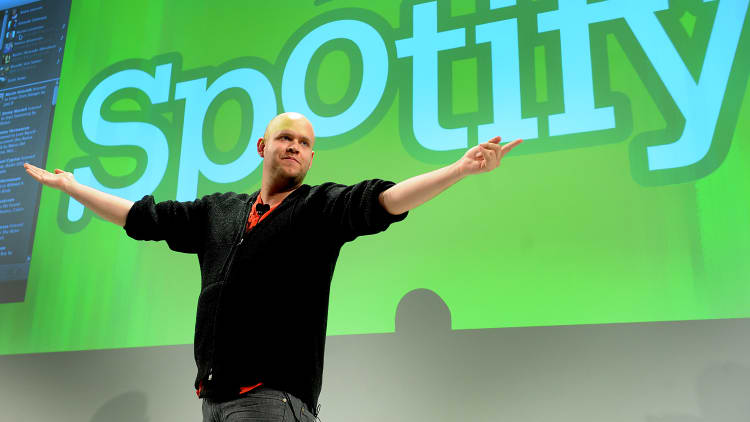
Spotify began trading shares at the NYSE on Tuesday, but its unusual listing had already reignited a debate about how Wall Street leads private companies into the public spotlight.
Usually, this process begins when the company hires a bank or two to arrange an initial public offering. The bankers' role is to drum up investors, agree on a price for the offering and make every possible effort to push the stock to a successful debut, including stepping in and buying shares to stabilize the first few days of trading.
IPOs are usually accompanied by some fanfare, too.
This time, Wall Street isn't taking a central role in the process. While Spotify has some bank advisors, it did what is called a direct listing, allowing it to trade on an exchange without all the regulatory hassles and expensive bankers that are the hallmarks of the traditional IPO. NYSE changed its rules to allow the listing to move forward.
After waiting all morning, Spotify began trading just after 12:30 p.m. ET at $165.90 a share, valuing the company at about $29 billion. That is up 25.6 percent from a reference price of $132, though because banks weren't involved in underwriting the offering, the stock wasn't bought or sold at that lower price.
As the broad market traded higher on Tuesday, Spotify shares did not keep up. They closed their first day at $149.01, a drop of 10 percent from their official opening price.
For Spotify's founder and CEO, Daniel Ek, the listing wasn't supposed to be the most important day for the company. "Normally, companies ring bells. Normally, companies spend their day doing interviews on the trading floor touting why their stock is a good investment," he said in a blog post on Monday. "Our focus isn't on the initial splash."
That has led to some speculation that big banks were secretly hoping Spotify's listing would be rocky, at best. After all, if the direct listing goes smoothly, other tech companies could follow suit and cut into an important revenue source for big banks.
Banks "have no incentive to support this deal," said Matt Kennedy, an IPO market strategist at Renaissance Capital, a provider of IPO ETFs and research.
"It's going to be a really interesting natural experiment," said John Coffee, director of the Center on Corporate Governance at Columbia Law School, who also agrees the investment bankers are probably not on Spotify's side, missing out on fees and the potential for a big one-day bounce for important institutional clients.
Market conditions were already not ideal for a public debut, whether a traditional IPO or not. The Dow Jones industrial average and the were down nearly 3 percent on Monday, and the tech-heavy Nasdaq had erased its gains for the year. In Tuesday trading, the markets had recovered some ground, with the Dow up 1.65 percent.
Spotify, whose stock ticker is SPOT, acknowledged in its risk disclosures that its first trading day may be more volatile than normal because there aren't any bankers at the ready to smooth out problems.
"There could be greater volatility in the public price of our ordinary shares during the period immediately following the listing," the company said in a securities filing for the offering. "Such differences from an underwritten initial public offering could result in a volatile market price for our ordinary shares and uncertain trading volume and may adversely affect your ability to sell your ordinary shares."
IPO alternatives have been tried in the past with more or less success. In 2004, Google sold shares in a Dutch auction that was largely viewed as a disaster at the time. It priced on the low end of its expected range and didn't get the eye-popping first day gain many had expected.
Of course, Google parent Alphabet's shares now trade at 10 times more than where the Google shares closed that day.
And there isn't any guarantee that a traditional IPO will go smoothly. Facebook's much-hyped debut in 2012 inspired a wave of lawsuits after a technical error by Nasdaq bungled the first hours of trading. Snap shares also got off to a rocky start last year. But Dropbox's IPO last month went well.
Big private companies like Spotify have been able to avoid selling shares to the public because they can easily raise money themselves, a trend that has Wall Street banks scrambling for IPO business. Coffee says Spotify is using the public listing to unlock liquidity for employees and could be a model for other large private companies in a similar situation.
In the mid- to late 1990s, there were hundreds of tech IPOs every year, peaking at 376 in 1999, according to Dealogic.
From 2015 through last year, there have been an average of 31 tech IPOs a year. And the initial day pop in trading has also dwindled, from an annual average gain of 26 percent from 1995 through last year, to an average return of 20 percent for the nine tech IPOs this year, according to Dealogic.
Banks had a role making sure to dot the i's and cross the t's in a stock debut, and that gatekeeper role is threatened by alternatives. "A bank historically staked its reputation on the offering," said Charles Elson, director of the Weinberg Center for Corporate Governance at University of Delaware.
"Breaking the convention has created some real risks for investors."

